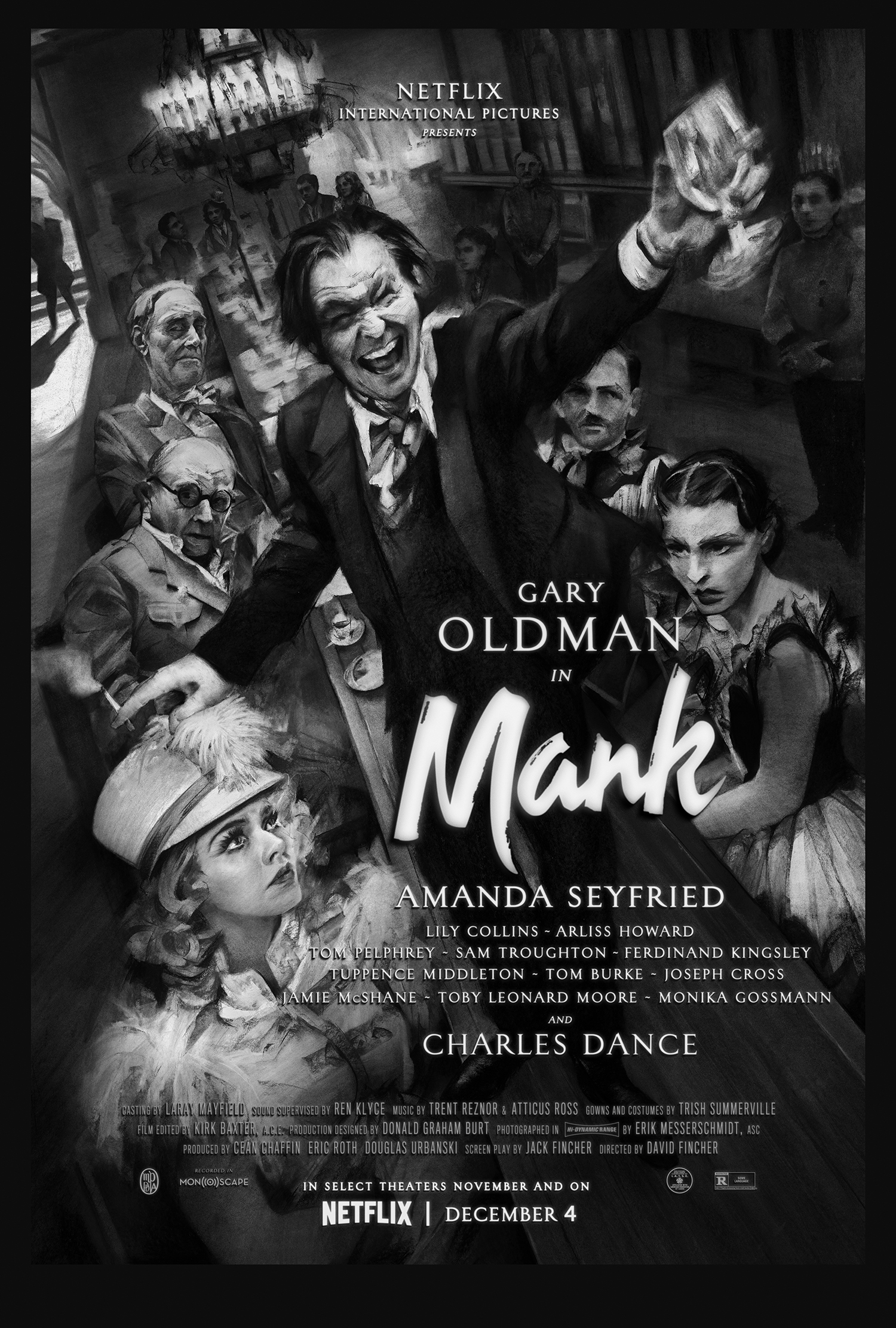Well, it’s now officially Oscars season—that is, if there even will be an Oscars event next year—and studios are releasing their best films. We’re finally seeing more emotionally driven scripts and performances, as well as cinematography meant to wow audiences. Many of these films have substance and deserve a nomination, but several don’t. We call those films “Oscar bait.”
Where does Netflix’s latest release, Mank, stand? I thought director David Fincher’s latest film was one of the better films to come out of 2020 despite me having a couple of issues with it. I’ve always been a fan of most of Fincher’s filmography, my favorites being Fight Club, Zodiac, Gone Girl, and The Social Network, as well as many episodes of his thriller series Mindhunter. And Mank, while I don’t think is quite as good as Fincher’s previous work, at least holds its own. It’s one of the most unique films he has made yet. It’s quite ambitious.
Fans of David Fincher who may be looking for his usual dark and gritty thriller style won’t find it in this biopic. Instead, we get a black-and-white love letter to old Hollywood as David Fincher tells the untold story behind “the greatest film of all time” – Citizen Kane. Mank is a cinematic biography of Herman J. Mankiewicz, the creative mind behind the script of Citizen Kane, and it paints the picture of everything surrounding the creation of the iconic film. We get a front-row seat to 1930s California’s political climate, Hollywood’s drama during this time, and the deterioration of Mank’s life in a swirl of alcoholism, romance, and depression. And, I must say, it is very interesting.
First and foremost, Mank is a technical delight. Shot and lit perfectly in black-and-white, this film’s cinematography and coloring are two of the first things you notice. It looks great, and its black-and-white color-grading does not detract from the visual impact.
Another well-done technical aspect of the film is its sound design. When I first watched it, I remember thinking, “What is up with all that reverb?” It sounded like everything was recorded in a big, empty room. I looked it up later and discovered that David Fincher had intentionally mixed the sound that way in order to replicate the experience of viewing the film in an old theater. It may take viewers a while to get used to it, and some people may find it distracting, but I found it charming once I learned to love it.
Trent Reznor and Atticus Ross did a great job scoring the film. Despite having worked with David Fincher before on his previous films, this score is actually quite different from their normal EDM/dark synth style. In Mank, they give us an emotive, dramatic orchestral style, reminiscent of 1930s Hollywood. It’s beautiful.
The only technical aspect that I found fell short was the use of CGI animals in one scene. They weren’t even forgiving in black-and-white and dim lighting. It was kind of distracting enough to pull me out of the story momentarily. But, thankfully, that scene only lasted for about a minute.
What really sells this film are the performances. Gary Oldman is absolutely fantastic playing the titular screenwriter. He brings a certain likability to the character that makes you relate to and root for him despite his many flaws. I’d say it’s Oldman’s career-best performance!
Amanda Seyfried shines as this film’s supporting actress in the role of actress Marion Davies. In the past, I hadn’t been impressed by Amanda’s performances. She seems to have a knack for being in some pretty terrible films. But this was the best performance I’ve ever seen from her. She portrays the actress in a magnetic and charming way while still bringing a great sense of believability to her character. I hope she continues to expand her horizons in more daring roles like this one.
And, although he is not in the film as much, another stand-out performance is Tom Burke as the legendary actor and filmmaker, Orson Welles. I’ve never seen Burke in anything before this, but I must say that his impression of Orson Welles is uncanny. He’s not merely a good impressionist of Orson Welles; he is Orson Welles! He truly lives through the character. I do hope that Tom Burke moves on to be more than just an Orson Welles impressionist.
Overall, I really enjoyed the script. It reveals a lot of interesting details that I was previously unaware of about the writing of Citizen Kane and the people involved in it. The Mank script has a unique format, cutting back between the present and the past throughout the film. This method brings a unique perspective to the story, connecting key events in the film and initiating a deeper level of understanding.
Another noticeable aspect of the script is its flowery dialogue. Now, this could be considered either a detriment or an enhancement, because many of the lines sound like poetry. However, several times I had difficulty following along with what was happening because much of the poetic dialogue went over my head. This is most likely a “me” problem and not a fault of the film, but I’m being honest about my experience.
I also took issue with the intent of the film. As with most biopics, certain liberties are taken with the narrative to either make the story more cinematic or to get a certain message across. One of the subplots in Mank involves the election of a certain California governor and how Hollywood was used as a tool to influence the polls. Of course, Mank, in this film, is portrayed as the hero who stood against such tactics, when, in reality, it doesn’t look like Herman Mankiewicz was involved in it at all.
There is also a polarizing “Republicans bad, Socialism good” narrative going on with Mank being on the side of the latter. But, from what I’ve read, Herman Mankiewicz leaned Conservative. It felt ironic that this film seems to be doing exactly what it claims to be criticizing.
Some of this film’s details about the writing of Citizen Kane aren’t as nuanced as what actually happened. For those of you who are unaware of the history behind the iconic film, over the decades, there has been controversy over how much of the Citizen Kane script was written by who. Both Orson Welles and Herman Mankiewicz are credited as the screenplay writers. However, years later, claims came out against Orson Welles accusing him of not having written a word of the screenplay, thus taking unearned credit for the famous screenplay. Yet, at the same time, allegations came out claiming he did have a hand in writing the screenplay. Either way, the true story was never made clear, and I’m afraid that this film was too quick to take one side of the story without taking into account the other.
Despite the problems I had with the intent of this film, I found that the technical aspects, the performances, and the engaging characters make it very much worth watching. I highly recommend any movie lover watch it.




0 Comments